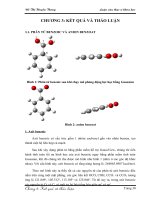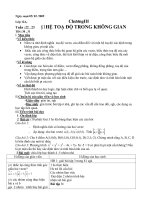- Trang chủ >>
- Khoa Học Tự Nhiên >>
- Vật lý
LEPTOGENESIS IN SUPERSYMMETRIC ECONOMICAL 3 3 1 MODEL
Bạn đang xem bản rút gọn của tài liệu. Xem và tải ngay bản đầy đủ của tài liệu tại đây (122.88 KB, 6 trang )
Proc. Natl. Conf. Theor. Phys. 35 (2010), pp. 6-11
LEPTOGENESIS IN
SUPERSYMMETRIC ECONOMICAL 3-3-1 MODEL
DO THI HUONG, HOANG NGOC LONG, NGUYEN THI THUY
Institute of Physics, VAST, P. O. Box 429, Bo Ho, Hanoi 10000, Vietnam
Abstract. We study a leptogenesis scenario in which the heavy Majorana neutrinos are produced
non-thermally in inflaton decays in the supersymmetric economical SU(3)C ⊗ SU(3)L ⊗ U(1)X
model with inflationary scenario. The lepton-number violating interactions among the inflaton
and right-handed neutrinos appear at the one-loop level, and this is a reason for non-thermal
leptogenesis scenario. The bound followed from the gravitino abundance and the cosmological
0.05
eV. By taking the
constraint on neutrino mass/the neutrino oscillation data is: mν3
δef f
reheating temperature as low as TR = 106 GeV, we get a limit on the ratio of masses of the light
R1
= 0.87.
heavies neutrino to those of the inflaton to be: M
Mφ
I. INTRODUCTION
The recent experimental results confirm that neutrinos have tiny masses and oscillate
[1], this implies that the standard model (SM) must be extended. Among the beyond-SM
extensions, the models based on the SU(3)C ⊗ SU(3)L ⊗ U(1)X (3-3-1) gauge group [2, 3]
have some intriguing features: First, they can give partial explanation of the generation
number problem. Second, the third quark generation has to be different from the first two,
so this leads to the possible explanation of why top quark is uncharacteristically heavy.
An additional motivation to study this kind of the models is that they can also predict
the electric charge quantization [4].
On the other hand, to explain the well-known matter-antimatter asymmetry, the
baryogenesis plays an important role. In addition, primordial lepton asymmetry is converted to baryon asymmetry in the early universe through the “sphaleron” effects of electroweak gauge theories [5] if it is produced before the electroweak phase transition. Thus,
the leptogenesis scenario [6] seems to be the most plausible mechanism for creating the
cosmological baryon asymmetry.
II. NEUTRINO MASS IN SUPERSYMMETRIC 3-3-1 MODEL
WITHOUT INFLATIONARY SCENARIO
II.1. Tree-level Dirac mass
At the tree-level, the neutrinos get masses from the term
−λab LaL LbL ρ + H.c,
(1)
c
c
0
c ν
c
νbL − νaL νbL
+ νaL
−λab (νaL
bL − νaL νbL )ρ .
(2)
which gives us
LEPTOGENESIS IN SUPERSYMMETRIC ECONOMICAL 3-3-1 MODEL
7
This mass term can now be rewritten in terms of a 6 × 6 matrix Xν by defining the
following column vector
(ψν0 )T =
c
c
c
ν1L ν2L ν3L ν1L
ν2L
ν3L
Now we can rewrite our mass term as
1
(ψν0 )T Xν ψν0 + H.c ,
−L =
2
with
⎛
⎞
0
0
0
0 G21 G31
⎜ 0
0
0 G12
0 G32 ⎟
⎜
⎟
v ⎜
0
0
0
G
G
0 ⎟
13
23
⎜
⎟≡
Xν = √ ⎜
0
0
0 ⎟
2 ⎜ 0 G12 G13
⎟
⎝ G21
0 G23
0
0
0 ⎠
0
0
0
0
G31 G32
.
(3)
(4)
T
0
MD
MD
0
where
Gab = λab − λba .
(5)
Due to√
the fact that Gab = −Gba , the mass pattern of this sector is 0, 0, mν , mν , mν , mν ,
where 2mν = v G231 + G232 + G221 . Noting that this mass spectrum is the same as of the
non-supersymmetric version and the mass spectrum is not realistic [7]. The most general
neutrino mass spectrum is in the following form:
Mν =
T
ML MD
MD MR
,
(6)
where ML,R (vanish at the tree-level) and MD get possible corrections.
II.2. The one-loop corrections to the Dirac and Majorana masses
The Yukawa couplings of the leptons and the relevant Higgs self-couplings are explicitly rewritten as follows:
+
c
c −
c c −
= λab νaL lbL ρ+
Llept
3 + λab νaR lbL ρ1 + γab νaL lR ρ1 + γab νaR lR ρ3 + H.c.,
Y
=
Lrelv
H
+
g2 † b
† b
† ∗b
2
(χi λij χj − χi† λ∗b
ij χj + ρi λij ρj − ρi λij ρj )
8
2
1
g2
1
2
2
− χ† χ + χ † χ + ρ† ρ − ρ † ρ
12
3
3
3
3
(7)
w, w , the masses of the charged Higgs bosons get approximate
In the limit v, v , u, u
values such as [8]: mρ − mW , mρ+ 0, mρ+ mζ2 = 0, mρ − mζ3 = 0
1
1
3
3
With the couplings given in (7), the right- and left-handed neutrino mass matrices
are given by
⎡
⎛
⎞⎤
2
2
√ g2
m
m
λab v ⎣1 − 2a ⎝1 − ln 2a ⎠⎦
(ML )ab ∝ −(MR )ab = 2
2
16π
mρ −
mρ −
1
tree
)ab ∝ v
(MD
(8)
8
DO THI HUONG, HOANG NGOC LONG, NGUYEN THI THUY
Thus, the one-loop correction leads to the relationship ML = −MR , which is similar
to the case of non-supersymmetric economical 3-3-1 model [7]. These mass matrices are
g2
proportional to the value v but they are suppressed by an extra factor 16π
2 . Contribution
to the mass matrix MD of the form
⎡
⎛
⎞⎤
2
2
2
g
m
m
rad
)ab =
λ v ⎣1 − 2a ⎝1 − ln 2a ⎠⎦
(MD
16π 2 ab
mρ −
mρ −
1
∝ v.
(9)
It is very interesting that the scale for one-loop correction to the Dirac masses is the same
as that of the tree level. However, unlike the case of the tree level, the mass matrix given
in (9) is non-antisymmetric in a and b. Hence, after including the one-loop correction
to the Dirac neutrino mass, all three eigenvalues of the Dirac mass matrix are non-zero.
On the other hand, the left and right handed neutrino mass matrices are gained at the
one-loop correction. However, there is no larger hierarchy between ML , MR and MD .
Below we shall show that, in the model with inflationary scenario, the type I seesaw
mechanism can appear naturally.
III. THE SEESAW MECHANISM IN SUPERSYMMETRIC
ECONOMICAL 3-3-1 MODEL WITH INFLATIONARY SCENARIO
We have constructed a hybrid inflationary scheme based on a realistic supersymmetric 3-3-1 model by adding a singlet superfield Φ which plays the role of the inflation,
namely the inflaton superfield [9]. Let us remind that the inflationary potential is given
by
(10)
Winf (Φ, χ, χ ) = αΦχχ − µ2 Φ.
The superpotential related to the neutrino masses is
Wneut = µ0a La χ φ
(11)
Integrating out the superspace gives the relevant interaction Lagrangian for the one-loop
correction to neutrino mass
c
φχ30 + H.c.,
Lint = µ0a νaL φχ10 + µ0a νaR
rel.
VHiggs
2
2
= α (χχ )
(12)
(13)
Besides the relevant Higgs self-coupling given in Eq.(13), there is another Higgs potential
contributing to the neutrino mass at the one-loop correction, namely
2
1 †
g2
1 †
2 †
2 †
− χ χ+ χ χ + ρ ρ− ρ ρ
VD =
12
3
3
3
3
g2 † b
† b
† ∗b
2
(χ λ χj − χi† λ∗b
+
(14)
ij χj + ρi λij ρj − ρi λij ρj )
8 i ij
with g , g are the gauge couplings of U (1), SU (3)L groups, respectively. Because of this,
the g coupling constant is the co-variant function of energy and the g coupling constant
is the contra-variant function of energy. At the inflationary and preheating times, the g
LEPTOGENESIS IN SUPERSYMMETRIC ECONOMICAL 3-3-1 MODEL
9
coupling constant is dominated and we will ignore the self Higgs coupling in the second
line of Eq.(14). On the other hand, requiring that the nonadiabatic string contribution
to the quadrupole to be less than 10%, the coupling α belongs to 10−4 ÷ 10−8 [9]. If we
compare this value with that of g coupling constant at the early time of universe, the
values of α coupling is tiny enough to ignore the Higgs self-coupling given in Eq.(13). In
short, at the inflationary and preheating times, the Lagrangian related to the one-loop
correction to neutrino mass is given by
c
φχ30 + H.c.
Lint = µ0a νaL φχ10 + µ0a νaR
U (1)
VD
2
=
g
12
1
1
2
2
− χ† χ + χ † χ + ρ† ρ − ρ † ρ
3
3
3
3
(15)
2
(16)
At the one-loop order, there is no correction to the mass matrix MD but there is correction
to the mass matrices ML and MR given
We assume the vacuum expectation values w, u, v are the same as w , u , v , respectively. The neutrino masses are the eigenvalues of the matrix:
inf
T
MD
MLab
inf
MD MRab
(17)
u , u, v , v and u , u
v , v and (MR ∝ w2 , MD ∝
Because of the condition w , w
2
2
v , ML ∝ u ), we obtain a hierarchy in values of the elements of the neutrino mass [12]:
inf
MRab
MD
inf
MLab
(18)
The heavy and light eigenvectors are found to be diagonalize the matrices
inf
inf −1
T
; mν = MD MRab
MD
mR = MRab
(19)
The inflaton with mass around 1017 GeV plays the role of new physics in the economical
models with inflationary scenario.
IV. NON-THERMAL LEPTOGENESIS VIA INFLATON DECAY
Let us consider the non-thermal leptongenesis scenario in our model. In the
non-thermal leptongenesis scenario, the right handed neutrinos are produced through the
direct non-thermal decay of the inflaton. In our scenario, there is no interaction term
which describes that decay process at the tree level. However, the necessary interaction
arises at the one-loop level. The relevant self Higgs and inflaton couplings is given by
Lthermal =
∂Winf
∂χ
2
+
∂Winf
∂χ
2
= α2 |χ|2 + |χ |2 φ
(20)
From Lagrangian given in (15) and (20), the effective interaction relevant for the right
handed neutrinos and inflaton at the one-loop correction is given in Fig. 1.
The effective Lagrangian for the process φ → νR νR is given by
LνR νR φ = Aef f φνR νR + H.c
(21)
10
DO THI HUONG, HOANG NGOC LONG, NGUYEN THI THUY
φ
α2
χ03
c
νbR
µ0b φ
χ03
mφ
×
φ
µ0a νaR
Fig. 1. Feynman diagram for the process φ → νR νR
where Aef f stands for effective coupling, which is obtained
Aef f
∝ 54
MR 2
α
g 2 w2
(22)
|Aef f |2
mφ
4π
(23)
The inflaton decay rate is given by
Γ(φ → νR νR )
with mφ is the inflaton mass.
We assume that the inflaton φ decays dominantly into a pair of the lightest heavy
Majorana neutrino, φ → νR1 , νR1 and other decay modes including these into pair νR2 , νR3
are forbidden.
The lepton asymmetry is converted to the baryon asymmetry through the “sphaleron”
effects which is given by
nL
nB
=a
(24)
s
s
8
in the MSSM. The ratio of the lepton number to entropy density after
with a = − 23
preheating is estimated to be [10]
3
TR
nB
= −0.35 × Br (φ → νR1 , νR1 )
× .
s
2
Mφ
(25)
On the other hand, the ratio of the lepton number to entropy density after preheating
can be written as
δef f mν3
MR1
TR
nB
10−10 Br (φ → νR1 νR1 )
.
(26)
6
s
10 GeV
Mφ
0.05 eV
The cosmological constraint on the gravitino abundance gives a bound on the reheating
temperature [11]: TR < 107 GeV. Assuming that the reheating temperature is: TR = 106
GeV and combining with the observed baryon number to entropy ratio, we get a constraint
on the heaviest light neutrino as [12]:
mν3 > 0.01 eV.
(27)
LEPTOGENESIS IN SUPERSYMMETRIC ECONOMICAL 3-3-1 MODEL
11
V. CONCLUSIONS
In this paper, non-thermal leptogenesis in which the heavy Majorana neutrinos are
produced through inflaton decays in the supersymmetric economical 3-3-1 model with
inflationary scenario has been considered.
In the model with inflationary scenario, the lepton-number violating interactions
among the inflaton and right-handed neutrinos appear at the one-loop level. Thus, it not
only gives a solution for the above puzzle but also gives a chance for studying non-thermal
leptogenesis scenario.
REFERENCES
[1] For reviews, see: W. -M. Yao et. al. (Particle Data Group), J. Phys. G: Nucl. Part. Phys. 33 (2006)
1, and references therein.
[2] F. Pisano, V. Pleitez, Phys. Rev. D 46 (1992) 410; P. H. Frampton, Phys. Rev. Lett. 69 (1992) 2889;
R. Foot, O. F. Hernandez, F. Pisano, V. Pleitez, Phys. Rev. D 47 (1993) 4158.
[3] M. Singer, J. W. F. Valle, J. Schechter, Phys. Rev. D 22 (1980) 738; R. Foot, H. N. Long, Tuan A.
Tran, Phys. Rev. D 50 (1994) 34 (R), arXiv:9402243 [hep-ph]; J. C. Montero, F. Pisano, V. Pleitez,
Phys. Rev. D 47 (1993) 2918; H. N. Long, Phys. Rev. D 54 (1996) 4691; ibid. 53 (1996) 437.
[4] F. Pisano, Mod. Phys. Lett. A 11 (1996) 2639; A. Doff, F. Pisano, Mod. Phys. Lett. A 14 (1999) 1133;
C. A. de S. Pires, O. P. Ravinez, Phys. Rev. D 58 (1998) 035008; C. A. de S. Pires, Phys. Rev. D 60
(1999) 075013; P. V. Dong, H. N. Long, Int. J. Mod. Phys. A 21 (2006) 6677.
[5] V. A. Kuzmin, V. A. Rubakov, M. E. Shaposhnikov, Phys. Lett. B 155 (1985) 36.
[6] M. Fukugita, T. Yanagida, Phys. Lett. B 174 (1986) 45.
[7] P. V. Dong, H. N. Long, D. V. Soa, Phys. Rev. D 75 (2007) 073006.
[8] P. V. Dong, D. T. Huong, N. T. Thuy, H. N. Long, Nucl. Phys. B 795 (2008) 361.
[9] D. T. Huong, H. N. Long, Phys. Atom. Nucl. 73 (2010) 791, arXiv:0807.2346 [hep-ph].
[10] K. Kumekawa, T. Moroi, T. Yanagida, Prog. Theor. Phys. 92 (1994) 437; G. Lazarides, arXiv:hepph/9904428; G. F. Giudice, M. Peloso, A. Riotto, I. Tkachev, JHEP 08 (1999) 014; T. Asaka, K.
Hamaguchi, M. Kawasaki, T. Yanagida, Phys. Lett. B 464 (1999) 12.
[11] E. Komatsu et al., arXiv:1001.4538 [astro-ph.Co]; G. Hinshaw et al. (WMAP Collaboration),
arXiv:0803.0732 [astro-ph].
[12] D. T. Huong, H. N. Long, Non-thermal leptogenesis in supersymmetric 3-3-1 model with inflationary
scenario, arXiv:1004.1246 [hep-ph], submitted to JPG.
Received 25-09-2010.









